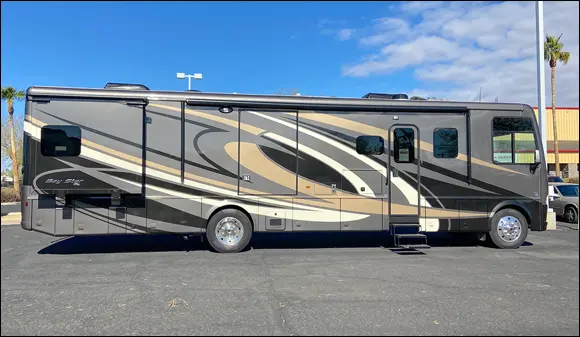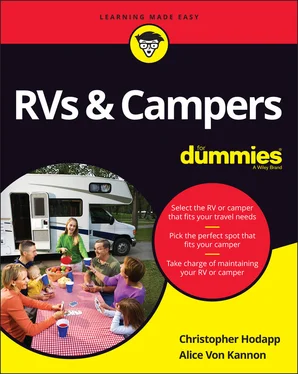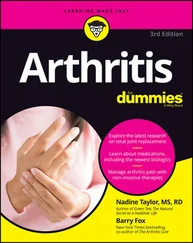1 ...7 8 9 11 12 13 ...23 One of the attractions of a motorhome is that passengers can get to everything easily while the vehicle is on the road. Safety experts agree that everybody should remain seated and belted in at all times when tooting down the highway, but the reality is that everybody (except the driver) can get up, move around, go to the bathroom, walk back and lie down in bed, raid the fridge, or watch a movie, all without stopping. That’s not the case with a towable trailer.
In the RV world, the question of whether to buy a gasoline-powered motorhome or towing vehicle versus a diesel-powered one can sometimes enflame the sort of religious passions unseen since the Spanish Inquisition. Online discussions can quickly turn into battling revival meetings competing to save the souls of the undecided.
Most Class A rigs are powered by diesel, but some models have gasoline engines. With Class B and C, you have more choice. The same is true when you go shopping for a tow vehicle. Ford, Chevrolet/GMC, and RAM all offer a diesel option for their heavier-duty 0.75-ton and 1-ton consumer pickup trucks. We talk all about choosing towing vehicles in Chapter 7.
The pro-gasoline side has immediate economic savings in their favor. Gas-powered trucks and motorhomes are usually less expensive than diesels, often by a lot. And the price-per-gallon of gasoline is cheaper than diesel, too (at least as of this writing), and these beasts are mighty thirsty. Diesel fuel can be formulated differently, depending on the time of year and where you are in the country, because it’s a thicker, oilier type of fluid than gasoline. Get stuck with the wrong kind of diesel fuel when the temperature gets bitter cold, and it can turn into a gel, making it difficult to even start the engine. Many sources also recommend adding diesel exhaust fluid (DEF) every time you fill the tank to keep smoke from belching out of your exhaust pipe — so there’s another expense.
Diesel fuel also stinks worse than gasoline, and it seems to get all over everything sooner or later. That sounds like a whiny complaint, but there are folks who regard it as a deal breaker. You’ll undoubtedly step in a puddle of diesel fuel or get it on your clothes when you fill up. And you can’t always be positive that every gas station you come to has diesel. It’s less common when you get off the highway and take the scenic route. So motorhome RVers like to stick to truck stops, where diesel is always available (and where they have the room to maneuver their long rigs).
The biggest Class A motorhome diesel engines are usually on par with those found in commercial trucks. That means they’re much more expensive to maintain than gasoline engines. That quick-lube place on the corner isn’t going to give you its $19.95 oil change special for your Class A. The engine will have to be fixed and maintained by an RV dealer or a commercial truck service center. Because of the way diesel pushers are built, working on one often means the mechanics need to access the engine by going into your bedroom, bathroom, or closet and opening up the floor to reach components inaccessible from the outside. That adds time and expense. And no matter how long the shop needs to fix your RV, remember that you’ve just lost both your house and transportation until it’s fixed.
Now that we’ve talked you out of it, diesel has lots of advantages over gasoline, which is why most Class A motorhomes have diesel engines. Big Class As weigh a lot, even when they’re empty. And diesel engines generate more horsepower and torque, which means they can pull more weight more efficiently, especially when it comes to climbing hills. High-end Class As are packed full of heavy appliances, real porcelain toilets, granite countertops, custom wood cabinetry, and other weighty materials, even before you throw in your family and all their stuff and fill all the water tanks. A diesel engine is better at handling that massive load. (These same issues come into play when choosing a diesel truck for towing a heavy, loaded fifth-wheel trailer.)
Diesel also gets slightly better mileage per gallon than gasoline. With a big Class A coach, expect about 9 to 11 miles per gallon with a diesel engine, and closer to 7 to 9 miles per gallon with gasoline. Diesel engines cost more to buy, but they last much, much longer than their gas-powered counterparts. Diesel engines are designed for the long-distance, weight-hauling chores of commercial trucks.
Another consideration is that diesel Class A motorhomes often ride quieter on the inside because most are diesel pushers, with the engine mounted all the way in the back of the coach. Gasoline engines are usually up front, under the cockpit floor between the front seats.
Bottom line: If you intend on keeping your motorhome or tow vehicle for a long time and putting more than 100,000 miles on it, a diesel engine is the hands-down favorite. It also wins if you’re driving a heavier motorhome that’s towing a car or boat. But if you suspect you’ll only use your RV a few weeks a year and you plan on putting less than 10,000 miles on it annually, you can lean toward the savings of a gasoline engine.
 It’s actually illegal in many states for people to bounce around inside of a moving trailer that’s being towed, with a long list of really good reasons. And don’t think of leaving your pet back there. By contrast, in a motorhome, everybody is supposed to remain in their seats when it’s moving, and many of the couches, chairs, and even dinette seats are equipped with seat belts. Children should be belted in at all times. It’s a lot like being in a plane when the captain turns off the seatbelt sign. Even on the smoothest road, it can be a bumpy experience. And you can turn into a human cannonball if the driver suddenly hits the brakes.
It’s actually illegal in many states for people to bounce around inside of a moving trailer that’s being towed, with a long list of really good reasons. And don’t think of leaving your pet back there. By contrast, in a motorhome, everybody is supposed to remain in their seats when it’s moving, and many of the couches, chairs, and even dinette seats are equipped with seat belts. Children should be belted in at all times. It’s a lot like being in a plane when the captain turns off the seatbelt sign. Even on the smoothest road, it can be a bumpy experience. And you can turn into a human cannonball if the driver suddenly hits the brakes.
When you pull out of your driveway in a motorhome, it carries everything, even electricity (most motorhomes have onboard electrical generators). When you compare sizes and prices with towable RVs, the sticker shock of motorhomes takes some getting used to, but remember, you’re self-propelled. You don’t have the additional expense of buying a $30,000 to $70,000 truck to haul it with. You also don’t have to tow anything behind you, although plenty of people do add a hitch to the back end to drag a car or even a boat. (You can find more about towing a car in Chapter 19.)
There are three basic classifications of motorhomes, and naturally, they don’t follow a logical order. Class A is the biggest, Class B is the smallest, and Class C is somewhere in between. To further confuse the matter, some manufacturers have tried to straddle those categories and blur the lines between them, particularly with the new categories of B+ and C+.
Class A motorhomes (like the one shown in Figure 2-1) are the most common type of motorized RV you’ll find on the road. One way you can spot a Class A and tell it from other types is that the front end is usually flat, without a hood and with a big picture window for the windshield. Driver and passenger seats are right up in the front, like sitting in the front row of a movie theater without anyone blocking the view.

Photograph courtesy of Christopher Hodapp
FIGURE 2-1:Class A motorhomes are the big dogs of the RV world.
Class As generally range from 25 to 45 feet in length (more than three times as long as your average midsize car these days). They’re typically roomy enough on the inside to comfortably accommodate 8 to 12 people as you roll down the road or turn in for the night. They can also be some of the biggest and most luxurious RVs around.
Читать дальше

 It’s actually illegal in many states for people to bounce around inside of a moving trailer that’s being towed, with a long list of really good reasons. And don’t think of leaving your pet back there. By contrast, in a motorhome, everybody is supposed to remain in their seats when it’s moving, and many of the couches, chairs, and even dinette seats are equipped with seat belts. Children should be belted in at all times. It’s a lot like being in a plane when the captain turns off the seatbelt sign. Even on the smoothest road, it can be a bumpy experience. And you can turn into a human cannonball if the driver suddenly hits the brakes.
It’s actually illegal in many states for people to bounce around inside of a moving trailer that’s being towed, with a long list of really good reasons. And don’t think of leaving your pet back there. By contrast, in a motorhome, everybody is supposed to remain in their seats when it’s moving, and many of the couches, chairs, and even dinette seats are equipped with seat belts. Children should be belted in at all times. It’s a lot like being in a plane when the captain turns off the seatbelt sign. Even on the smoothest road, it can be a bumpy experience. And you can turn into a human cannonball if the driver suddenly hits the brakes.











